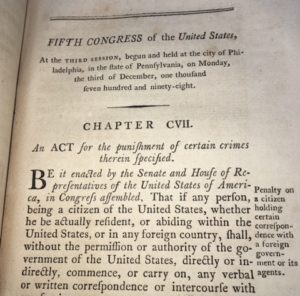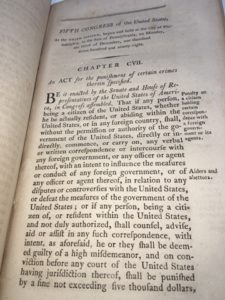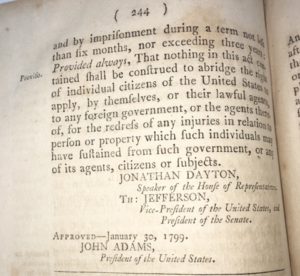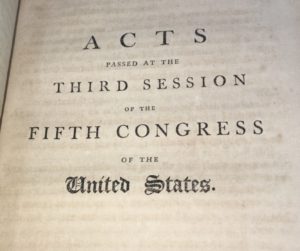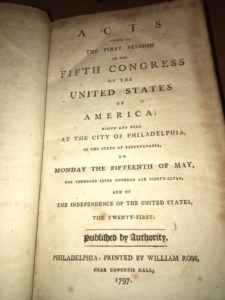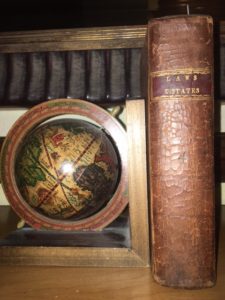THE LOGAN ACT of 1799 – Prohibiting Diplomacy by Private Citizens “without permission or authority” with intent to “influence the measures or conduct of any foreign government” in a dispute with the U.S., or to “defeat the measures” of the U.S. A violation is a felony punishable by up to three years imprisonment.
[Fifth Congress, Third Session, January 30, 1799; 1 Stat. 613, 18 U.S.C. 953]
The Logan Act was adopted by the Federalist Congress under President John Adams during escalating hostilities with France, known as the “Quasi-War”, following the notorious “XYZ Affair.”
The Logan Act was a direct response to private diplomacy with France conducted by George Logan, a Philadelphia Quaker in 1798.
The Act, in its entirety, provides:
Act for the punishment of certain Crimes therein specified.
Be it enacted by the Senate and House of Representatives of the United States of America in Congress assembled, That if any person, being a citizen of the United States, whether he be actually resident, or abiding within the United States, or in any foreign country, shall, without the permission or authority of the government of the United States, directly or indirectly, commence, or carry on, any verbal or written correspondence or intercourse with any foreign government, or any officer or agent thereof, with an intent to influence the measures or conduct of any foreign government, or of any officer or agent thereof, in relation to any disputes or controversies with the United States, or defeat the measures of the government of the United States; or if any person, being a citizen of, or resident within the United States, and not duly authorized, shall counsel, advise, aid or assist in any such correspondence, with intent, as aforesaid, he or they shall be deemed guilty of a high misdemeanor, and on conviction before any court of the United States having jurisdiction thereof, shall be punished by a fine not exceeding five thousand dollars, and by imprisonment during a term not less than six months, nor exceeding three years: Provided always, that nothing in this act contained shall be construed to abridge the right of individual citizens of the United States to apply, by themselves, or their lawful agents, to any foreign government, or the agents thereof, for the redress of any injuries in relation to person or property which such individuals may have sustained from such government, or any of its agents, citizens or subjects.
https://www.loc.gov/law/help/statutes-at-large/5th-congress/c5.pdf
The Logan Act was adopted along party lines by a margin of 58–36 in the House and 18–2 in the Senate. It was one of many laws adopted by the Federalist Congress as it ramped up for war with France, including the Alien and Sedition Acts.
For other laws precipitated by the XYZ Affair as America prepared for war with France: https://statutesandstories.com/blog_html/alien-sedition-acts-1798/
George Logan was eventually elected as a Democratic-Republican to the Senate from Pennsylvania, serving from July 1801 to March 1807. He unsuccessfully attempted to repeal the Logan Act during his time in Congress. Years later in 1810, as a dedicated pacifist, Logan traveled to England as part of a private diplomatic mission intending to improve relations prior to the outbreak of the War of 1812.
In 2006, James Sensenbrenner, the Chairman of the House Judiciary Committee, proposed to amend the Logan Act to only criminalize knowingly false statements made under oath intended to influence a foreign government. Sensenbrenner’s unsuccessful amendment was offered as part of H.R. 6253, a comprehensive proposed modernization of the federal criminal code, which was never adopted.
Background:
In the 1790s, the French revolutionary government was experiencing economic difficulties as it tried to expand its revolution. Naturally, it looked to its ally, the Unites States for support. During the American Revolution, France had provided critical assistance to the American colonies. Competing factions within President Washington’s cabinet were bitterly divided. President Washington believed in a policy of strict neutrality. Secretary of the Treasury Alexander Hamilton sought closer economic and political ties with England. By contrast, Secretary of State Thomas Jefferson after having returned from a five-year mission in Paris, advocated for a pro-French policy based on earlier treaty commitments in 1778 with France.
Hamilton and the Federalists ultimately prevailed leading to the Jay Treaty of 1794 which expanded commercial ties and improved relations with England. The French felt betrayed and interpreted the Jay Treaty as a violation of 1778 treaty obligations with France. As retaliation in 1796, the French surreptitiously placed an embargo on U.S. shipping, strategically timed to maximized the capture of American ships. Following the seizure of American ships and sailors, President John Adams dispatched three U.S. envoys to France: Elbridge Gerry, Charles Pinckney, and John Marshall.
Upon arriving in France, Gerry, Pinckney and Marshall discovered that they were unable to formally meet with the French Foreign Minister, the Marquis de Talleyrand. They were approached by several intermediaries later referred to as “XY and Z”. These French go-betweens stated that Talleyrand would only be willing to meet with them and conclude an agreement if the following conditions were satisfied. The French demanded a substantial bribe to Talleyrand, required the U.S. to provide France with a low-interest loan, and assume and pay American merchant claims against the French.
When Gerry, Pinckney and Marshall’s report to President Adams arrived home, it created an outcry in America. President Adams and the Federalists prepared for war. Leaders of Jefferson/Madison’s Democratic-Republican party were suspicious of Adams’ motives. They demanded that President Adams publicly release diplomatic correspondence describing the French negotiations. When President Adams released the correspondence, he replaced the names of the French intermediaries with the letters W, X, Y, and Z.
